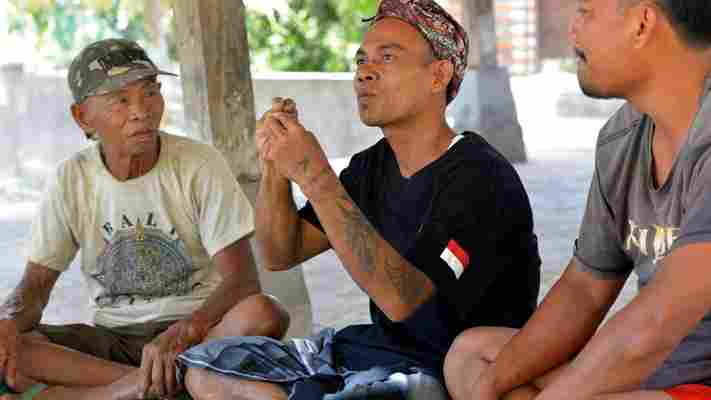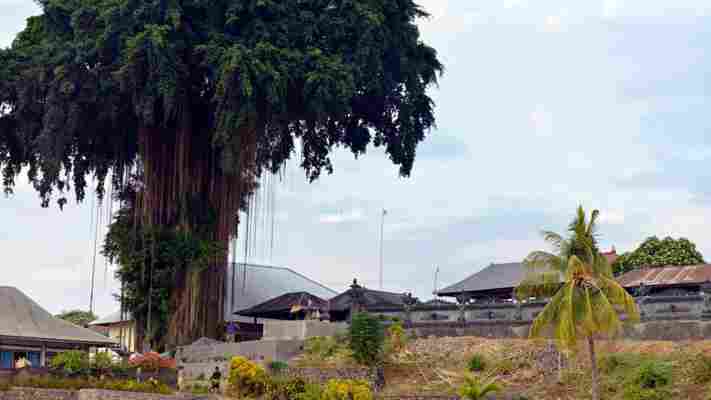Kolok Getar flexed his biceps, puffed out his chest and jutted a pugnacious jaw. Although the old man was sitting cross-legged on the concrete floor, his wiry Balinese frame took on the characteristics of a belligerent bantam fighting cock.

“He used to be known as a real tough guy,” his nephew Wisnu smiled. “He was famous as a martial arts expert and could break coconuts in half with his hand.”
Kolok Getar pointed at a row of palms that were swaying in the hilltop breeze. His gnarled fingers formed the shape of a large sphere and he delivered a vicious chop to the imaginary coconut. The circle of friends seated on the floor around him broke into applause. Apart from their bursts of laughter (and Wisnu’s translations into Indonesian for my benefit), the entire conversation had taken place without a word being uttered.

Kata Kolok, meaning ‘deaf talk’ in Indonesian, is a unique sign language that is the primary means of communication for just 44 people (Credit: Mark Eveleigh)
You may also be interested in: • Why no-one speaks Indonesia’s language • The language the French forbade • The Indian tribe that deals in venom
Kata Kolok, literally meaning ‘deaf talk’ in Indonesian, is a unique sign language that is currently the primary means of communication for just 44 people on the entire planet. For about six generations, an unusually large proportion of Bengkala’s population has been born deaf – something that locals for many years attributed to a curse, but which scientists have more recently pinned down to a recessive gene (known as DFNB3) that over the decades has resulted in about one in 50 babies in this community being born deaf. But in many ways these people – all deaf from birth and referred to as ‘ kolok’ (deaf) by their fellow villagers – are more fortunate than deaf people in other areas. That’s because more than half of the hearing people in the highland village of Bengkala have also learned Kata Kolok, solely for the benefit of communicating with deaf family members and friends.
Very few tourists make the two-hour drive from the tourist centre of Ubud over the volcanoes to the coastal hinterlands of north Bali, which remain one of the poorest parts of the island. Most of the kolok in Bengkala carve a subsistence living from farming or labouring, but traditionally have also been hired by their fellow villagers as security guards and gravediggers. Today, as Kolok Getar relives his martial arts glory days, he and his friends are waiting for a funeral that is scheduled to happen at the Pura Dalem (Death Temple) on the outskirts of Bengkala.
If it’s your destiny to be born deaf, then this would very likely be the best place in the world to grow up
“When my uncle was younger, he toured the island making a small living by giving martial arts demonstrations,” Wisnu translated as Kolok Getar continued his story in a whirl of karate-chop hand signs. “He met many deaf people but could hardly communicate with them, because, if they knew sign language at all, it was a different version [from the one used in Bengkala]. Those deaf people were often lonely because they could only talk with one or two members of their close family.”
By comparison, the kolok of Bengkala are relatively fortunate. They’re able to communicate with a large proportion of people in this 3,000-strong, close-knit village.
“If it’s your destiny to be born deaf,” said I Ketut Kanta, spokesman for Bengkala’s Deaf Alliance, “then this would very likely be the best place in the world to grow up!”

Kata Kolok is only used in the village of Bengkala, Bali, where an unusually large proportion of the population has been born deaf (Credit: Mark Eveleigh)
Hearing people are known as ‘ enget’ , and no matter where you are in the village you will often come across mixed groups of kolok and enget all chatting in what they call ‘deaf talk’. Whether you’re visiting the primary school, at the central temple or sipping sweet black kopi (coffee) at Pak Suparda’s little warung (stall), you’re likely to see deaf and hearing people in animated but silent conversation, or jostling each other with boisterous laughter.
The signs in Kata Kolok are often so surprisingly obvious that even a new arrival will understand: the sign for ‘male’, for example, is a rigidly pointing index finger, while the sign for ‘father’ is the same finger curved across the top lip like a moustache. ‘Woman’ is denoted with two fingers forming a narrow opening, while ‘mother’ is a cupped breast. ‘Thirsty’ is shown by the stroking of an apparently parched throat, and ‘coffee’ is a finger twisting against the forehead in the same manner that is used to denote a crazy person in the West.
Kata Kolok has evolved naturally and is constantly being added to by the most imaginative and garrulous among the village’s signers. A side-effect of this is that this village seems to have more than its share of talented and highly energetic actors. The most effervescent of the Kata Kolok communicators bring a joyful mood of laughter and slapstick that seems to be a powerful bonding tool between the deaf and the hearing.
“Kolok and enget are paid equal rates for work in the village,” I Ketut Kanta told me. “Nevertheless, it isn’t easy for deaf people to find a job outside the village, and it is sometimes hard to get by here on local labour wages of about US$5 a day.”
Kata Kolok has evolved naturally and is constantly being added to (Credit: Mark Eveleigh)
However, today Kolok Getar and his four kolok friends are fortunate: they’ve been hired to dig a grave. Balinese Hindus typically cremate their dead, but it is an expensive ceremony. So, as is common here, I Nyoman Widiarsa’s sons must bury their father while they save for the costs of a cremation.
A Balinese funeral is often unnerving to Western sensibilities since (outwardly at least) it appears often to be an almost joyous affair. The Balinese believe that if the spirit of the dead person senses grief among his family members, he may have second thoughts about moving on to the next life. That’s why the ceremony takes place with the same sort of light-hearted chatter with which the Balinese seem to do everything.
They have a reputation for being tough and fearless
That means that the clowning and prancing of Kolok Getar and his grave-digging colleague Kolok Sudarma at the graveside was not considered inappropriate. Even the close family laughed along. They lowered the body carefully into the hole and Kolok Sudarma climbed down into the grave to place the mirrors in position back on the corpse’s eyes. These mirrors are said to guarantee that the deceased will be reborn with clear vision in the next life. (Interestingly, there is no similar ritual for the ears).
“Hearing people used to say that the koloks could communicate with the evil spirits that haunt graveyards,” Wisnu told me, “but the truth is that they simply have a reputation for being tough and fearless.”
Bengkala’s kolok community often find work as security guards and gravediggers because of their reputation for being brave (Credit: Mark Eveleigh)
Some Bengkala villagers claim their deaf friends are immune to the spooky noises – whispers from the grave and evil spirits – that ‘haunt’ hearing people. Others point out that manual labour and a need to fend for themselves when they leave the village has given rise to the kolok toughness. Whatever the reason, there is a noticeable level of respect in the village for the kolok community, and several villagers have set out to champion their cause.
I Ketut Kanta gives free Kata Kolok lessons to children. Connie de Vos, a Dutch researcher from the Centre for Language Studies at Radboud University in the Netherlands, has visited many times over the course of the last decade and helped I Ketut Kanta lobby for the inclusion of kolok children in the local school and for Kata Kolok lessons for hearing children. The village also has a craft centre, called KEM, where several kolok women are employed to produce woven textiles on traditional handlooms. The centre also attracts occasional tourist groups who come to watch kolok martial arts as well as a specially choreographed dance known as Janger Kolok, which has become locally famous and is even performed at hotels and government conferences throughout the region.
Many hearing residents of Bengkala have learned to sign in order to communicate with kolok family and friends (Credit: Mark Eveleigh)
Linguists have established that the Kata Kolok language, like their unique dance, has little in common with other sign languages.
“Kata Kolok has very little influence from either Indonesian or Balinese spoken language or from sign languages outside the village,” said Hannah Lutzenberger, a PhD candidate at Radboud University who is fluent in Kata Kolok after four long stints in the village. “An insight into the richness of Kata Kolok can be derived from the name signs for deaf individuals,” she continued. “All kolok are known by name signs. Because this is a vibrant signing community, these names are usually given by deaf peers relatively early in life but they can change throughout a lifetime. They usually relate either to appearance or to a personal habit.”
Kolok Getar, for example, is known by a forward-pointing hand held in front of the mouth. It might look like a beak, but, by the time I’ve crossed paths with him several times in Bengkala’s narrow streets, I’ve noticed him adopt that same posture frequently as he acts out the martial arts glories of his younger years. I realise that this action will for all time remind me of this cheerful man.
Every kolok has a name sign that usually relates to his or her appearance or to a personal habit (Credit: Mark Eveleigh)
While he’s forgotten many of his martial arts skills, Kolok Getar is still respected in the area, even at 78 years old. He’s been given the responsibility for the maintenance of the water pipes, which in this arid northern part of the island is quite literally the lifeblood of his community. When there’s a broken pipe, it’s his job to travel up into the hills to find the break. Often the cause turns out to be people from a neighbouring village who ‘poached’ the water for their own use.
“I try never to use violence when I catch them,” the old man signed, with such a tough and determined look that I nod my head in energetic agreement, “but I don’t need to, because people around here know that you don’t tangle with a kolok… It’s an unspoken rule.”
Our Unique World is a BBC Travel series that celebrates what makes us different and distinctive by exploring offbeat subcultures and obscure communities around the globe.
Join more than three million BBC Travel fans by liking us on Facebook , or follow us on Twitter and Instagram .
If you liked this story, sign up for the weekly bbc.com features newsletter called "If You Only Read 6 Things This Week". A handpicked selection of stories from BBC Future, Culture, Capital and Travel, delivered to your inbox every Friday.
